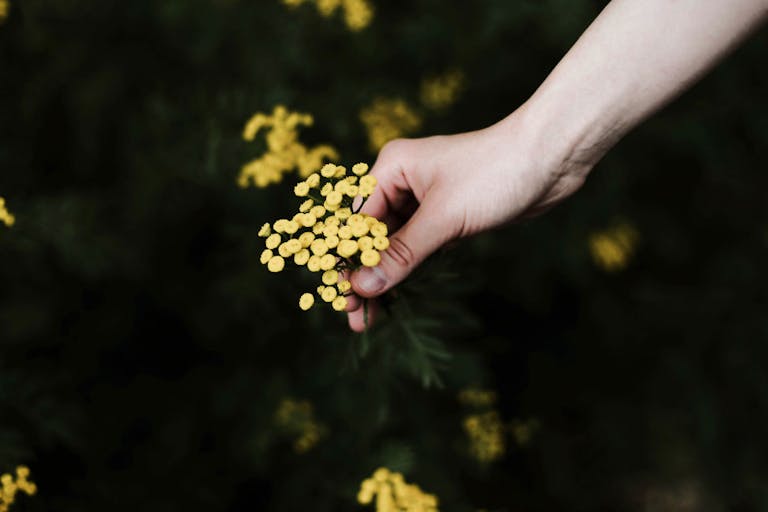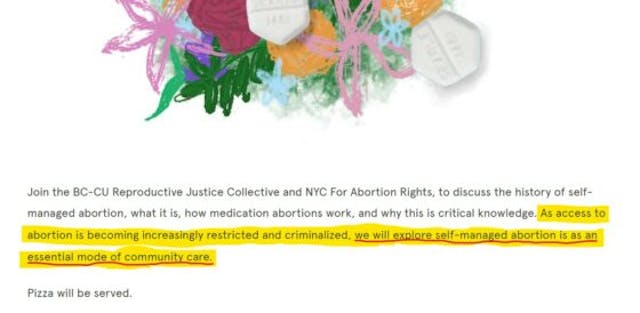
Fact Check: Woman says she was denied treatment as baby 'poisoned her from inside out'
Nancy Flanders
·
Barnard College library supports abortifacient ‘garden’ and ‘self-managed abortion’ event
(The College Fix) An exhibit at Barnard College about the “changing conditions of reproductive rights in the United States” includes dried herbs and an outdoor garden with plants historically used to induce abortions.
The “Trigger Planting 2.0” exhibit debuted in October. On-going events connected to the display include an information session Tuesday on “self-managed abortion” and the “abortion pill.”
Together, the projects seem to imply that women may use the plants to abort their unborn babies if they want to.
At the event Tuesday, participants will “discuss the history of self-managed abortion, what it is, how medication abortions work, and why this is critical knowledge,” the event page states. “As access to abortion is becoming increasingly restricted and criminalized, we will explore self-managed abortion is as an essential mode of community care.”
The event is co-sponsored by the exhibit itself, the college library, and the Barnard Center for Research on Women.
None of the individuals or groups connected to the abortion display responded to multiple requests for comment from The College Fix over the past month. The Fix asked if the abortion garden will be permanent, if the plants on display are for educational purposes only, and if there are any warning labels to discourage home experimentation.
In a follow up email Monday, The Fix also asked for more details about the “self-managed abortion” event and the organizers’ response to concerns that some might raise about women’s safety.

Michael New, a professor at Catholic University of America, expressed safety concerns about the abortion garden.
“It appears that the exhibition is spreading misleading information about abortion,” New told The Fix in a recent email. “No herbal abortifacient has been approved for use by the FDA. Many herbal abortifacients are toxic and pose serious health risks. I doubt that this is mentioned in the display.”
New also questioned the ambiguity surrounding the garden itself. He regularly researches and writes about abortion, including the harms of abortion drugs.
“It is possible that this display might cause women to use herbal abortifacients at home, resulting in negative health consequences. It is also possible that students are permitted to eat the herbs from the garden itself. There hasn’t been much reporting on that,” New told The Fix.
New said that while the private institution “is certainly allowed to display support of legal abortion,” there needs to be greater efforts to support opposing views.
“I sincerely doubt that Barnard is making a similar investment in any kind of program that promotes pro-life perspectives,” New told The Fix. “When universities come down aggressively on one side of a controversial issue, that can have a chilling effect. It certainly does not foster debate and dialogue.”
At Barnard, architecture Professor Kadambari Baxi is one of the leaders behind the exhibition at the Milstein Center for Teaching and Learning.
Article continues below
Dear Reader,
In 2026, Live Action is heading straight where the battle is fiercest: college campuses.
We have a bold initiative to establish 100 Live Action campus chapters within the next year, and your partnership will make it a success!
Your support today will help train and equip young leaders, bring Live Action’s educational content into academic environments, host on-campus events and debates, and empower students to challenge the pro-abortion status quo with truth and compassion.
Invest in pro-life grassroots outreach and cultural formation with your QUADRUPLED year-end gift!
“The plants displayed in Trigger Planting were historically used for abortion and reproductive health by herbal practitioners as self-managed options that empowered women and families,” Baxi stated in a university news article.
The plants and signs describing how they were used are on display both inside as dried herbs and outdoors in a garden.
“Visitors to the Milstein Center for Teaching and Learning will find the plants lined neatly behind a large map of the United States hanging in the lobby, as well as in outdoor planting beds, as part of an exhibition that surveys shifting political, legal, social, and environmental landscapes and advocates for expansive reproductive justice in a post-Roe world,” the article states.
The map marks states where abortions are legal, restricted, or banned. In New York, where Barnard is located, abortions are legal with few restrictions.
The name of the display refers to “trigger laws,” which is pro-life state legislation that went into effect when the U.S. Supreme Court overturned Roe v. Wade in 2022.
Miriam Neptune, the director of exhibitions at the library, is the curator of Trigger Planting 2.0, according to the university.
“This exhibition seeks to inspire a conversation about the impact of abortion access legislation on real people,” Neptune stated in the article.
The display is “fully funded” by the college. It is an updated version of a 2022 project Baxi was involved with, “TRIGGER PLANTING” by the group “how to perform an abortion” and A.I.R. gallery in partnership with National Women’s Liberation, according to a descriptionon the Barnard Library website.
Others involved with the exhibit include lead groundskeeper and horticulturist Keith Gabora, as well as other staff, students, and faculty.
In the university news article, Gabora suggested the abortion garden will be “permanent” and “praised the beautifying elements that the exhibition brings to campus.”
“The permanent location for the garden will continue to bring this cause to light long after the project is complete — I look forward to maintaining it and using it as a teachable entity in the future,” Gabora said.
Baxi and other project organizers plan to keep adding “new materials” to the exhibit “continually,” according to the article…
Continue reading at The College Fix.
Editor’s Note: This article was originally published at The College Fix and is reprinted here with permission.
Live Action News is pro-life news and commentary from a pro-life perspective.
Contact editor@liveaction.org for questions, corrections, or if you are seeking permission to reprint any Live Action News content.
Guest Articles: To submit a guest article to Live Action News, email editor@liveaction.org with an attached Word document of 800-1000 words. Please also attach any photos relevant to your submission if applicable. If your submission is accepted for publication, you will be notified within three weeks. Guest articles are not compensated (see our Open License Agreement). Thank you for your interest in Live Action News!

Nancy Flanders
·
Human Interest
Melina Nicole
·
Issues
Wesley J. Smith
·
Issues
Michael J. New
·
Issues
Right to Life UK
·
Politics
Tabitha Goodling
·